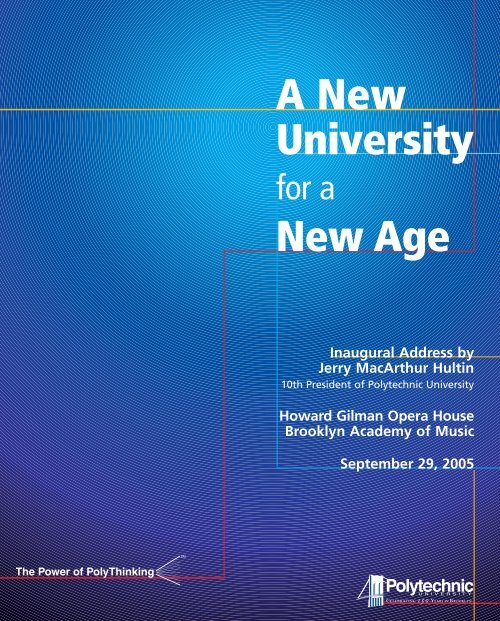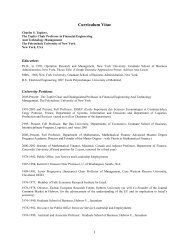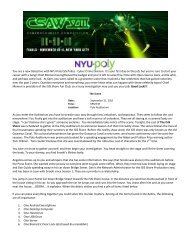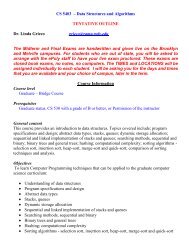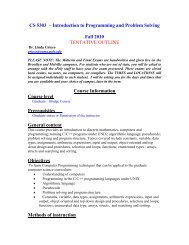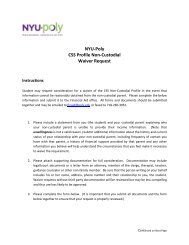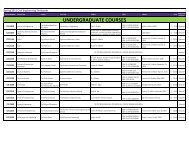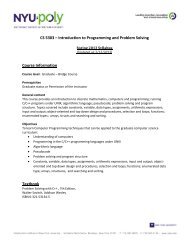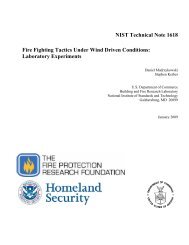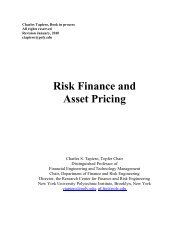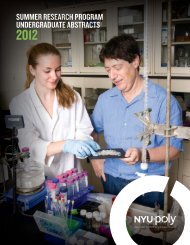A New University New Age - Polytechnic University
A New University New Age - Polytechnic University
A New University New Age - Polytechnic University
You also want an ePaper? Increase the reach of your titles
YUMPU automatically turns print PDFs into web optimized ePapers that Google loves.
A <strong>New</strong><br />
<strong>University</strong><br />
for a<br />
<strong>New</strong> <strong>Age</strong><br />
Inaugural Address by<br />
Jerry MacArthur Hultin<br />
10th President of <strong>Polytechnic</strong> <strong>University</strong><br />
Howard Gilman Opera House<br />
Brooklyn Academy of Music<br />
September 29, 2005
1 ✯ Jerry MacArthur Hultin, <strong>Polytechnic</strong> <strong>University</strong><br />
This is exciting! To stand here before<br />
you is exhilarating! I am thrilled about<br />
harnessing your energy and your talent<br />
to grow this gem of a school into an even<br />
more vibrant university. I feel privileged<br />
to have been chosen to be your president.<br />
✶ ✶ ✶ ✶ ✶<br />
Today, we have celebrated our past.<br />
Now, let us chart the course for our future.<br />
✶ ✶ ✶ ✶ ✶<br />
This new age is a product of new technologies:<br />
radar, the microchip, the satellite and<br />
the laser. The power of these technologies<br />
is evident all around us…in our cell phones, the<br />
Internet, our global positioning system, precision<br />
warfare, new medical cures, the global economy —<br />
and our iPods.<br />
Our new age is also a product of big ideas:<br />
democracy and free markets. We saw the force of<br />
these two ideas in the end of the Cold War, when<br />
Inaugural Address ✯ September 29, 2005 ✯ 2<br />
the innovative power of the western world toppled<br />
the centralized Soviet state and unleashed new<br />
energy and opportunity not only in the United<br />
States, but around the world. Nearly 3 billion new<br />
workers joined the global marketplace. Information,<br />
capital, goods — even terror — now move easily<br />
across borders into all corners of the earth. This is<br />
the world that Tom Friedman declared “flat!”<br />
Not only is the new world flat, but the global<br />
economy’s business model is deeply flawed. For<br />
China and India to make and finance the goods and<br />
services the United States and Europe consumes is<br />
lethal, not just to the United States, but to India<br />
and China. In this new age, we must help create a<br />
thriving middle class in India and China that consumes<br />
the goods and services it produces. To do this,<br />
we must not only educate our own country’s workforce,<br />
we must educate workers and build innovative<br />
enterprises throughout the world.<br />
As this new era develops, the people of the world<br />
are flocking to cities; over one million new urban<br />
dwellers arrive every week, demanding new roads,<br />
houses, schools, factories and offices. As this happens,<br />
the consumption of resources escalates and our<br />
effluence and waste begin to overwhelm the earth’s<br />
resilience. We must expand the value of resources<br />
and tame the impact of waste. The scale of this<br />
assignment is daunting, since the earth’s population<br />
will swell to over 8 billion people by 2030. Unless<br />
we think anew, more than half of these people will<br />
live on less than $2 a day.<br />
In this new age, advances in science and technology<br />
seem to threaten the moral and ethical<br />
foundations of the world’s religions. The concerns<br />
raised by genomics and evolution are visceral. We—<br />
especially the humanities and social sciences—must<br />
address these issues; otherwise, we will be denied<br />
the benefits of science and technology in this new age.<br />
President Jerry MacArthur Hultin<br />
Our new age is a product<br />
of big ideas: democracy<br />
and free markets.
3 ✯ Jerry MacArthur Hultin, <strong>Polytechnic</strong> <strong>University</strong><br />
Aerial view of<br />
<strong>Polytechnic</strong>’s campus<br />
Already, our young<br />
graduates are pursuing<br />
this new era’s opportunities.<br />
Last week, two<br />
recent graduates of<br />
<strong>Polytechnic</strong> visited with<br />
me to discuss their ambitions.<br />
One graduate has<br />
the rights to an engineered-housing<br />
product<br />
designed for developing<br />
countries, such as Latin America. On the heels of<br />
the recent hurricanes, he is gauging his capacity to<br />
supply housing to the Gulf Coast.<br />
With him came a second Poly graduate who<br />
has raised $2M of venture capital and is about to<br />
return to the capital markets for more. He has<br />
invented a new product. The product will be<br />
branded by a powerful European corporation,<br />
manufactured in China, and marketed to customers<br />
in the United States. Neither of these new<br />
age graduates has a traditional job, or depends on<br />
traditional skills, yet both are making a living —<br />
and both are excited about their future!<br />
[You] Our current undergraduates see this not as<br />
a “new era,” but the only era you have known. You<br />
were born after 1984. The Soviet Union disappeared<br />
before you graduated from grade school. Cell phones<br />
and the Intranet appeared during middle school.<br />
Before you finished high school, the human genome<br />
was decoded, the World Trade Centers fell and<br />
China and India arose.<br />
Young or old, we are in a new age with new<br />
demands. Our students and the world are calling<br />
on us to invent a new university that meets the<br />
needs of this new age.<br />
✶ ✶ ✶ ✶ ✶<br />
What are the qualities of a new university?<br />
In the tradition of great universities, I propose<br />
we enter into a dialogue of ideas about this new<br />
university. To begin this exchange, here are my<br />
thoughts. I am sure you will add others.<br />
Inaugural Address ✯ September 29, 2005 ✯ 4<br />
First, the new university should be the home of<br />
academic entrepreneurs, to borrow a term from my<br />
friend, Erich Kunhardt, who once roamed Poly’s halls<br />
as a faculty member. This new university should be<br />
composed of bright faculty who have the capacity<br />
and desire to invent and apply new science and technology<br />
to our most significant problems. Its fields<br />
and disciplines for research should be redefined:<br />
• computer science and biology are becoming<br />
bioinformatics,<br />
• energy requires chemistry and nano-physics,<br />
• management and computer science are creating<br />
something new called service innovation.<br />
Our goal should be to collaboratively advance<br />
science, math, engineering, management, the<br />
humanities and social sciences to help people at<br />
home and abroad.<br />
Second, the new university should open doors.<br />
As David Brooks wrote last Sunday in the <strong>New</strong> York<br />
Times: “…in an information society, college is the<br />
gateway to opportunity.” At <strong>Polytechnic</strong>, nearly 30<br />
percent of our students come from families with<br />
annual incomes below $20,000, a higher percentage<br />
of low-income families than either the State or City<br />
Universities of <strong>New</strong> York. Our role in creating<br />
opportunity in the “land of opportunity” sets us<br />
apart from private schools of privilege and to a<br />
surprising extent, the public schools around us.<br />
Now this distinction has gained <strong>Polytechnic</strong> new<br />
fame. This month, we were ranked by Washington<br />
Monthly as second in the nation for “social mobility”<br />
surpassed only by UCLA. On the east coast, not Yale,<br />
Harvard, Columbia, or NYU, but <strong>Polytechnic</strong><br />
<strong>University</strong> is at the top of the charts for making the<br />
American Dream. And why not, Poly alumnus and<br />
Pulitzer Prize-winning historian, James Truslow<br />
…the new university<br />
should be the home of<br />
academic entrepreneurs…
5 ✯ Jerry MacArthur Hultin, <strong>Polytechnic</strong> <strong>University</strong><br />
Adams, coined the expression, ‘the American Dream.’<br />
Third, the new university must be a global<br />
gateway to urban centers, both here and abroad,<br />
not an enclave, but a hub of collaboration and<br />
alliances with links around the world.<br />
To teach in this new age, we can use the urban<br />
landscape that surrounds us. Where better than the<br />
hurly-burly, rough and tumble boroughs of <strong>New</strong><br />
York to comprehend and design urban security,<br />
communications, transportation and quality of life.<br />
Internships with companies, governments and nonprofits<br />
will expand our students’ skills and enhance<br />
our communities. As Bob Kerrey, president of the<br />
<strong>New</strong> School, notes: one of the best places to hold a<br />
fruitful dialogue about the problems of Kashmir is<br />
not India or Pakistan, but rather Brooklyn or Queens.<br />
Think of a today’s young science or engineering<br />
student, fluent in English and also totally at ease<br />
in his or her family’s Chinese, Russian, Spanish or<br />
Farsi. Throughout life, he or she will have a special<br />
advantage whether doing research, starting a new<br />
business, or building a new city.<br />
For him or her, the American Dream will be<br />
the “Urban Dream” and the “Global Dream.”<br />
Fourth, as the new university grows, it will<br />
need to rethink vestiges of the current model. For<br />
instance,<br />
• How will we curb the price of tuition at this new<br />
university?<br />
• How will we give undergraduates an exciting<br />
role in research?<br />
• How will we re-engineer research so that the<br />
artificially linear funding categories — basic,<br />
applied, development — are fused into a more<br />
holistic, creative and entrepreneurial approach?<br />
A university can transform<br />
itself if…it is small enough to<br />
be agile and smart enough to<br />
think innovatively…<br />
Inaugural Address ✯ September 29, 2005 ✯ 6<br />
The Brooklyn Bridge<br />
• How will we integrate management, the humanities<br />
and social sciences more fully into our<br />
technical education?<br />
• How will we bring new faces to the governing<br />
boards of the new university? For the new university<br />
I have in mind will need a fresh contingent of<br />
trustees who know the entrepreneurial character<br />
of large urban centers around the world.<br />
✶ ✶ ✶ ✶ ✶<br />
How do we create such a university?<br />
One could, of course, repeat history in the manner<br />
of Johns Hopkins in 1876 and create it from whole<br />
cloth. Indeed, the recently opened Olin College of<br />
Engineering near Boston hopes to do just this.<br />
But one can also transform an existing university<br />
to meet these challenges. Such a transformation is<br />
unlikely at the most eminent of our great universities.<br />
They are, in the words of Clay Christensen, caught<br />
in the innovators dilemma with ‘rules’ that prevent<br />
them from seeing and responding to the perils of<br />
obsolescence.<br />
However, a university can transform itself if<br />
it has less at stake and more to gain; if it is small<br />
enough to be agile and smart enough to think<br />
innovatively; if it has diversity within its faculty<br />
and students; and if it has friends and supporters<br />
who will provide resources.<br />
✶ ✶ ✶ ✶ ✶
7 ✯ Jerry MacArthur Hultin, <strong>Polytechnic</strong> <strong>University</strong><br />
Inaugural Address ✯ September 29, 2005 ✯ 8<br />
Can <strong>Polytechnic</strong> be a new university?<br />
I spent this summer listening and learning from<br />
you in 100 personal discussions, in groups of 10<br />
and 20, and in a university-wide workshop.<br />
Here is what you taught me.<br />
<strong>Polytechnic</strong> is a university eager to change and<br />
grow. A renewal of <strong>Polytechnic</strong> has been underway<br />
for nearly 50 years. First, a renewal in moving<br />
from Livingston Street to Jay<br />
Street under Presidents Rogers<br />
and Weber. Then, a renewal in<br />
the creation of MetroTech…<br />
President Emeritus George<br />
Bugliarello’s dream, developed<br />
by Bruce Ratner! Most recently,<br />
a renewal…with the new dorm,<br />
the Jacobs Academic Building,<br />
the refurbished Rogers Hall,<br />
made possible by the beneficence<br />
of the Othmers and the<br />
Donald F. and<br />
Mildred Topp Othmer Jacobses under the presidency<br />
Residence Hall<br />
of Chancellor David Chang.<br />
<strong>Polytechnic</strong> is a university with an approach to<br />
teaching that encourages “first to college” undergraduates.<br />
We teach tough, technical subjects with<br />
compassion.<br />
<strong>Polytechnic</strong> is a university filled with exciting<br />
research expertise:<br />
• urban technologies,<br />
• information systems and secure networks,<br />
• wireless communications,<br />
• super-computer design,<br />
• cyber security,<br />
• convex geometry,<br />
• engineered materials,<br />
• polymers and bio-medical engineering,<br />
• new energy,<br />
• the science of services,<br />
• complex decision<br />
making,<br />
• financial engineering<br />
• and more.<br />
Our faculty and students embrace a richer range of<br />
talents and cultures than perhaps any private university<br />
in the United States.<br />
<strong>Polytechnic</strong> has been tested in the Big Apple.<br />
You know the words: “If I can make it here, I’ll make<br />
it anywhere!”<br />
<strong>Polytechnic</strong> has great supporters. Look around<br />
this historic opera house, we are surrounded by<br />
leaders, trustees, alumni, friends and family. Ours is<br />
a task which is going to need a great deal of help<br />
from others. Many are here on this stage and in this<br />
audience. Let’s give them a rousing thank you for<br />
being with us today!<br />
• Mayor Bloomberg — a believer in technology<br />
and education — and all the officials of Brooklyn,<br />
<strong>New</strong> York City, the state and our federal government.<br />
With your support, <strong>Polytechnic</strong> is ready<br />
to build a better society.<br />
• Craig Matthews, chairperson of the Board—<br />
and all the trustees. Each one cares deeply<br />
about our success.<br />
• Charles Camarda —<br />
who followed his<br />
dreams into space—<br />
and all the great<br />
PolyThinkers and honorary<br />
degree recipients<br />
here today. You make<br />
us proud by your<br />
achievements.<br />
One of <strong>Polytechnic</strong>’s state-<br />
-of-the-art computer labs<br />
WHO WILL SEE THE<br />
WORLD FROM<br />
AN ENTIRELY<br />
DIFFERENT<br />
PERSPECTIVE?<br />
WE WILL.<br />
CHARLES J. CAMARDA<br />
Space Shuttle Astronaut<br />
Class of ’74<br />
PolyThinking branding<br />
campaign poster<br />
• All our alumni, our<br />
guests from universities and colleges across the<br />
nation, and our friends and families. Your pres-
9 ✯ Jerry MacArthur Hultin, <strong>Polytechnic</strong> <strong>University</strong><br />
ence here shows how much you care about<br />
<strong>Polytechnic</strong>.<br />
This summer, you were clear: We are eager to grow;<br />
we excel at “social mobility;” we are agile, smart and<br />
innovative; our diversity mirrors the world; we are<br />
urban and global. We have powerful friends and<br />
supporters who care deeply about us.<br />
We have what it takes to create a new university.<br />
✶ ✶ ✶ ✶ ✶<br />
For an institution such as <strong>Polytechnic</strong> to survive<br />
and thrive for 150 years is a remarkable feat. Ours<br />
has been a celebrated history — with life-changing<br />
education and world-changing research. For a<br />
century and a half, <strong>Polytechnic</strong> has offered the<br />
world the American Dream. In social mobility, we<br />
are—like <strong>New</strong> York City—“king of the hill, head of<br />
the list, cream of the crop, top of the heap!”<br />
So now is hardly the time to hold back. In the<br />
words of a contemporary playwright, it is the time<br />
for “boldness, a willingness to imagine the future<br />
not purely as a continuation of the past.”<br />
Early in life, I learned the hardest part is when<br />
the bullets and the bombs stop flying, and you try<br />
to build something fresh and new.<br />
Working together and supporting each other,<br />
we can expand education and research…in the<br />
sciences, math, engineering, management, the<br />
humanities and social sciences…and meet the<br />
opportunities and challenges before us.<br />
I will need your help in this noble effort!!<br />
Will you join me…in making <strong>Polytechnic</strong> a<br />
university that thrives in <strong>New</strong> York City and<br />
around the world? Intensify our education, expand<br />
our research, raise resources and create a compelling<br />
brand. If we focus on our core mission and<br />
pay attention to basics day-to-day, we will create<br />
the proficiency, leadership and resources required<br />
to build a new university.<br />
Will you join me…in building a new university<br />
for a new age? Join me…in making <strong>Polytechnic</strong> a<br />
university that offers the scientific knowledge,<br />
technical skills, wisdom and courage that we all<br />
need to compete and succeed.<br />
Join me…in making <strong>Polytechnic</strong> a university that<br />
serves our community, the nation and the world.<br />
I am counting on you.<br />
Thank you!<br />
Inaugural Address ✯ September 29, 2005 ✯ 10<br />
✶ ✶ ✶ ✶ ✶<br />
Recommended Reading<br />
1. The Creation of the Future: The Role of the<br />
American <strong>University</strong>, Frank H.T. Rhodes<br />
2. Shakespeare, Einstein and the Bottom Line: The<br />
Marketing of Higher Education, David Kirp<br />
3. What the Best College Teachers Do, Ken Bain<br />
4. Necessity as the Mother of Tenure? Erich E. Kunhardt,<br />
<strong>New</strong> York Times OpEd, December 14, 2004<br />
5. The Next Fifty Years: Science in the First Half of<br />
the Twenty-First Century, John Brockman<br />
6. Linked: The <strong>New</strong> Science of Networks,<br />
Albert-Laszlo Barabasi<br />
7. Open Innovation: The <strong>New</strong> Imperative for Creating<br />
and Profiting from Technology, Henry Chesbrough<br />
8. The Ten Faces of Innovation: IDEO’s Strategies for<br />
Beating the Devil’s Advocate and Driving Creativity<br />
Throughout Your Organization, Tom Kelly<br />
9. Jamming: The Art and Discipline of Business<br />
Creativity, John Kao<br />
10. The Rise of the Creative Class…and how it’s transforming<br />
work, leisure, community & everyday life,<br />
Richard Florida<br />
11. The Fortune at the Bottom of the Pyramid:<br />
Eradicating Poverty Through Profits, C.K. Prahalad<br />
12. Flow: The Psychology of Optimal Experience,<br />
Mihaly Csykszentmihalyi<br />
✶ ✶ ✶ ✶ ✶


